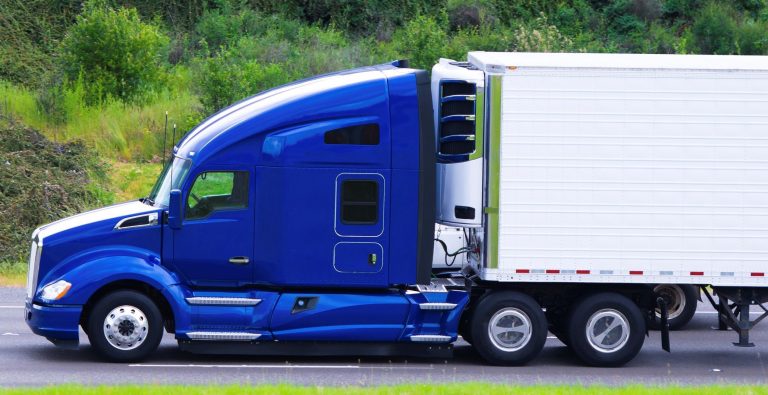
What is a Reefer?
By: Seth Newman
According to the Bureau of U.S. Transportation, nearly $671 billion worth of freight was transported in the United States in 2018 via truck. The refrigerated trailer or reefer for short was one of the most used modes of shipping. A reefer can help ship any temperature-sensitive freight like fresh produce, frozen foods and meat, beverages, medical instruments or equipment, chemicals, and nursery plants. If you have a shipment that needs to be kept frozen, protected from frost or heat or any temperature sensitivities, you’ll need to ship it with a reefer.

An example of a reefer truck.
A typical reefer trailer is 53 ft long with an exterior width of 102 inches. The interior width is usually 100 inches wide but with the backend doors open, the width to fit the freight inside the trailers is generally 98 inches wide. Legally, a reefer trailer can generally haul about 43,000 lbs of freight while maintaining the legality of 80,000 lbs gross weight total with the truck included. When shipping palletized freight, a reefer can haul up to 26 standard-sized pallets. A key visual difference between a dry van trailer and a reefer trailer that hauls temperature-sensitive freight is the refrigerated unit that is attached to the front end of the trailer to control the temperature. An example is shown below.
The back end of the reefer trailer generally has two different door types, a swing door, and a roll door. Swing doors are much more common and often preferred to roll doors because swing doors offer a few more inches of width to fit freight inside the trailer. The swing door back end is generally measured at 98 inches wide and 110 inches tall. A roll door backend is typically 94 inches wide and 104 inches tall.
Reefers have a huge temperature range depending on your freight needs. With the ability to change the temperature between 65 degrees and – 20 degrees, the reefer can help protect your freight during transit. Reefers can be used for various reasons when shipping freight. During the Summer months, reefers are used to protect the fresh produce from the heat and in the Winter months, reefers can be used to help protect freight from the harsh winter conditions that can result in frost in a trailer.
If you are thinking about shipping freight for the first time or wonder if your freight can be shipped on a reefer, contact an experienced transportation partner like Ally Logistics who will be happy to assist you and answer questions about the logistics of your freight. Ally ships coast-to-coast in the U.S. and has a large pool of dedicated carriers in our base to ensure that your freight is paired with the best carrier. With experience shipping fresh and frozen meats, ice cream, chilled beverages, food products, medical instruments and heat sensitive plants, Ally has shipped it all.
For more questions about Ally Logistics, or reefers, please email info@allylogistics.com or call one of our sales reps at 888-466-1024 to see how we can #BecomeAnAlly today!